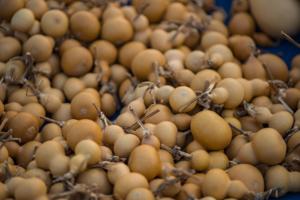Will Tomato Plants Produce if they Get too Much Nitrogen?
Tomatoes are a popular crop for gardeners and farmers alike. They are relatively easy to grow and produce a bountiful harvest. One of the keys to growing tomato plants successfully is providing them with the right amount of nutrients, including nitrogen. However, too much nitrogen can lead to problems with tomato production. This article will explore the effects of too much nitrogen on tomato plants and what gardeners can do to avoid these issues.
The Effects of Too Much Nitrogen on Tomato Plants
Nitrogen is an essential element for plant growth, but too much of a good thing can be harmful. When tomato plants get too much nitrogen, they tend to produce lots of leaves at the expense of fruit. This is because nitrogen is the nutrient that is most responsible for promoting leaf growth. As a result, tomato plants that are over-fertilized with nitrogen will be bushy and green, but they will produce few or no fruits.
In addition to reducing fruit production, excessive nitrogen can also lead to other problems in tomato plants. For example, it can make the plants more susceptible to diseases, such as blossom-end rot. This is a condition where the bottom of the tomato turns black and becomes sunken. This can happen because the excessive growth caused by too much nitrogen can lead to a calcium deficiency in the soil, which is necessary for proper fruit development.
How to Avoid Excessive Nitrogen in Tomato Plants
The best way to avoid issues with excessive nitrogen in tomato plants is to provide them with the right amount of fertilizer. Tomato plants need a balanced fertilizer that contains nitrogen, phosphorus, and potassium in a ratio of approximately 5-10-10 or 10-10-10. It is also important to apply the fertilizer at the right time. Gardeners should apply fertilizer to tomato plants when they are young and then again just before they start to produce fruit.
If gardeners suspect that their tomato plants have received too much nitrogen, there are several ways to address the problem. One way is to water the plants deeply to flush excess nitrogen out of the soil. Gardeners can also try adding organic matter, such as compost or aged manure, to the soil to help reduce the amount of available nitrogen. In extreme cases, gardeners may need to dig up and replant their tomato plants in a different location with better soil conditions.
In Conclusion
Nitrogen is an important nutrient for tomato plants, but too much of it can lead to reduced fruit production, disease susceptibility, and other problems. The key to growing healthy tomato plants is to provide them with a balanced fertilizer at the right time and monitor their growth for signs of excessive nitrogen. With proper care, gardeners can enjoy a bountiful harvest of delicious tomatoes year after year.

 how many times do yo...
how many times do yo... how many planted tre...
how many planted tre... how many pine trees ...
how many pine trees ... how many pecan trees...
how many pecan trees... how many plants comp...
how many plants comp... how many plants can ...
how many plants can ... how many plants and ...
how many plants and ... how many pepper plan...
how many pepper plan...































